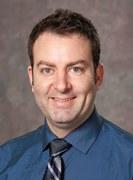Jeffrey Kennedy, M.D.
Brief Biography
 Dr. Kennedy is a board certified neurologist and epileptologist with expertise in clinical neurophysiology.
Dr. Kennedy is a board certified neurologist and epileptologist with expertise in clinical neurophysiology.
During his fellowship at Northwestern University in Chicago, Dr. Kennedy became interested in continuous electroencephalogram monitoring (cEEG) in patients admitted to hospital and intensive care units, authoring review literature on the use of cEEG in the ICU and reporting the rate of seizures and nonconvulsive seizures in patients with primary and metastatic brain tumors.
During his neurology residency at Northwestern University, Dr. Kennedy became interested in physiologic changes during seizures as potential mechanisms of Sudden Unexplained Death in Epilepsy (SUDEP) where he described heart rate variability changes in seizures which patients had prolonged post-ictal EEG suppression.
This work combined with his clinical interest in epilepsy and neurophysiology led him to continue investigating SUDEP mechanisms in collaboration with Masud Seyal, MD PhD at the University of California, Davis. Dr. Kennedy is now a Clinical Assistant Professor in the Department of Neurology.
Research and Clinical Overview
Sudden Unexpected Death in Epilepsy (SUDEP) is defined as sudden unexpected witnessed or unwitnessed non-traumatic or non-drowning death of patients with epilepsy, with or without evidence of a seizure, excluding documented status epilepticus and in whom postmortem examination does not reveal a structural or toxicological cause for death.
SUDEP has a reported incidence of between and 1-2 per 1000 patient years, the most common epilepsy related cause of death (Shorvon & Tomson 2011). SUDEP can have a devastating impact on families and comminutes. Thus, prevention of SUDEP is of utmost importance.
As a epileptologist, Dr. Kennedy is interested not only in the treatment of epileptic seizures, but also in preventing SUDEP in the significant proportion of patients for whom anticonvulsant medications have not achieved seizure remission and freedom. State of the art evaluation and care, including nonpharmacological treatments such as epilepsy surgery, neurostimulator devices, and the ketogenic diet are offered at the UC Davis Comprehensive Epilepsy Center, a level 4 National Association of Epilepsy Center.
Women with epilepsy require clinical care and expertise beyond seizure treatment. Anticonvulsant medications (pregnancy risk category D) carry up to a 10% risk for major malformation birth defects (Herndandez-Diaz et al 2012) and can impact the IQ of children exposed to anticonvulsants in utero (Meador et al 2009, Meador et al 2012). In addition, there are many drug-drug interactions between hormonal contraception and anticonvulsant drugs, often leading to failure of one or both therapies.
Given the level of complexity to consider the treatment of both epilepsy and family planning, a collaborative joint subspecialty clinic has been developed between the epilepsy and family planning sections of neurology and obstetrics and gynecology.
Since its inception, approximately thirty patients have participated in this clinic, where expert physicians have collaborated to treat epileptic seizures, consider family planning, and ensure treatments are effective, interactions are minimized, and patients receive education and counseling.
Research Program Details
Dr. Kennedy’s clinical research has focused on understanding the physiologic changes related to seizures, which may contribute or play a role in SUDEP.
Collaborating with colleagues from Neurophysiology (Dr. Parikh), Pulmonary Medicine (Dr. Harden), and Biostatistics (Dr. Li) under the mentorship of Dr. Seyal, an extensive database of physiological parameters: continuous EEG, continuous electrocardiogram, capnography, and pulse oximetry, recorded in in patients admitted to the UCDMC epilepsy monitoring unit has provided a rich resource to respectively study physiological changes in patients with epilepsy and during seizures.
Additional study of physiological changes in seizures is being investigated prospectively in the UCDMC EMU, such as monitoring cerebral blood flow, which changes predicts seizures (Seyal 2014) and pulmonary edema (Kennedy et al 2015).
In the joint neurology and gynecology clinic for women with epilepsy, clinical research is planned to review health care records to evaluate the impact of the clinic in improving patient care for treatment of seizures and meet guidelines for family planning.
Future Directions
Dr. Kennedy anticipates that continued work will unlock physiologic changes associated with epileptic seizures and the collaborative clinic with Family Planning Gynecology will provide a working model of improved quality and efficiency in clinical care in the treatment of patients with complex medical conditions.

